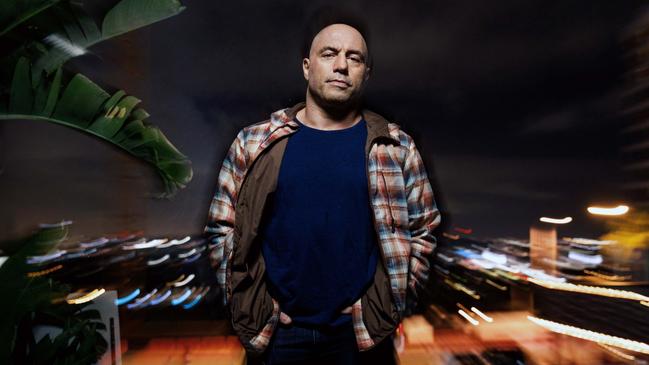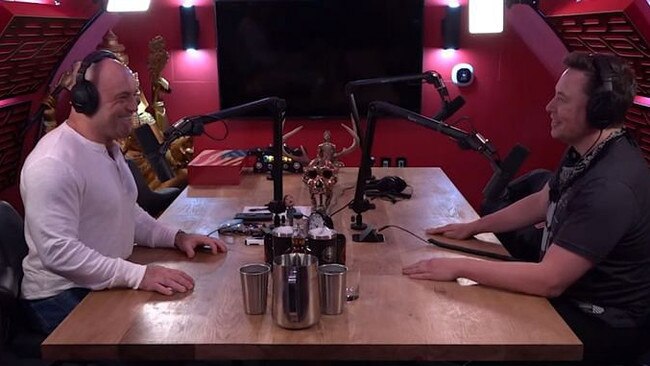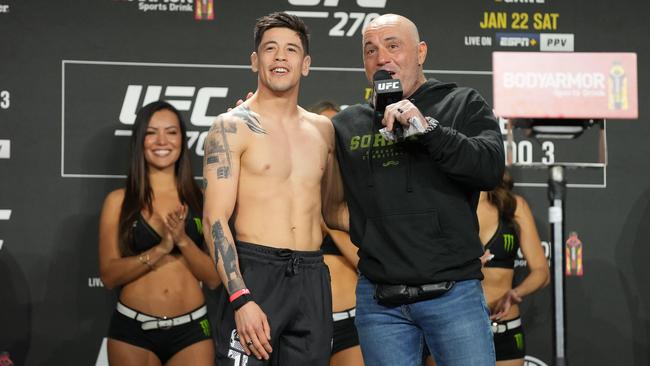How did Joe Rogan become one of the most consumed media products on the planet?
He’s a man flammable by bearing and branding. Irascible, uncensored and full of nutty opinions, make no mistake, podcaster Joe Rogan wields real power.

The other comics call him “Little Ball of Anger” – semi-affectionately, and never to his face. He’s a man flammable by bearing and branding, it seems, with his taekwondo muscles and a scorching conviction that the Bible has some holes. “Noah was 600 years old and a drunk!” Joe Rogan told his LA standup crowds some two decades back, in one favoured bit about the implausibility of the scriptural ark. Then he sparred afterwards with a waitress who was raised Catholic and was mindful of divine wrath. “Stand back,” Eleanor Kerrigan, the Comedy Store waitress who became a comedian herself, would say to Rogan, blessing herself as he left the stage. “You’re going to burst into flames.”
“It’s not sacrilegious!” Rogan protested, according to Kerrigan. “You’re not hearing what I’m saying!” Now, for better or worse, many millions of people are hearing what Joe Rogan is saying. He’s still not sure they’re always getting the joke. But he has yet to burst into flames.
Rogan, 54, is one of the most consumed media products on the planet, with the power to shape tastes, politics, and even medical decisions – a fact well-known to legions of men under 40 but befuddling, by his own admission, to the man himself. His podcast, The Joe Rogan Experience, is effectively a series of wandering conversations, often over whisky and weed, on topics including but not limited to: comedy, cage-fighting, psychedelics, quantum mechanics and the political excesses of the Left. The show was licensed to Spotify in 2020 in an estimated $US100 million deal, boosted by a conceit that can at times seem self-fulfilling: the host is dangerous, at least in the way that comedians like to be dangerous; he should probably not be taken at face value, except when he should, and the discerning listener should be trusted to tell the difference. And if the establishment has its way, Rogan would surely be chastened, “cancelled”, reeled in.
“I got through the net,” he said in one episode last year in what felt like a statement of purpose, “and I’m swimming in open waters.” It can all feel like something of a system breakdown in his telling, at once a testament to the trust-deficit plaguing mainstream institutions and the durable allure of convincing people they are listening to something subversive and undiluted.

In 2019, Rogan said his podcast was downloaded about 190 million times in a month. Some single episodes have reached tens of millions, including interviews with Elon Musk, the Tesla boss whose rollicking, joint-smoking appearance coincided with a discernible slip in the company stock price, and Alex Jones, the far-right conspiracy theorist with whom Rogan has long been friendly. “We worship this guy,” Kristian Khoury, a 20-year-old student at Oklahoma State University, said of Rogan, ticking off favourite episodes after joining a friend to see him perform standup in Houston last year. “I would do anything to do what he does.”
What Rogan does can be difficult to categorise neatly; on the surface, he’s a mass of contradictions. He is a generous listener who seems to share every half-thought aloud. He is publicly outraged by “recreational outrage”. He is, depending on the audience, the jock or the scholar, the bully or the aggrieved. His podcast uniform – bicep-hugging T-shirt, headphones pressed against a bare scalp – calls to mind a high-school wrestling coach who commandeered the media room.
He is equally liable to discuss the coronavirus, intelligently, with an epidemiologist and to discuss epidemiology, less intelligently, with another comedian. He makes market-moving recommendations for stuff: dietary supplements, CBD-infused beverages, nonfiction – an Oprah for the bodybuilding set or a Schwarzenegger for the Native American history buff, depending on the day. He also says he is not to be trusted as a “respected source of information”.

Rogan’s celebrity makes enough sense to those who know him. He ascended across the decades as a comic, sitcom actor and cage-fight commentator for the UFC. What is different now – exhilarating to his fans, alarming to others – is the social capital he’s managed to accumulate while proudly defying the traditional gatekeeping strictures of mainstream fame. It is a story of persistence, timing. He started recording himself nearly a dozen years ago for a live web assemblage of hundreds, and people listened. Then more. There were no network censors. His first sponsor was a sex toy company. “He didn’t need Hollywood,” says Dom Irrera, a long-time friend. “Joe’s got his own thing.”
And that thing has grown hulking enough to collide, occasionally, with institutions as varied as the White House, the British monarchy and music legend Neil Young. After Rogan suggested last year that young healthy people need not get vaccinated against coronavirus – before later stressing that he is “not an anti-vax” person and shouldn’t be considered a medical authority, anyway – his comments drew condemnations from the Biden administration and Prince Harry, another Spotify podcaster. “If you say you disagree with me, I probably disagree with me too,” Rogan said in semi-self-defence. “I disagree with me all the time.”
He continued on his way, hosting guests accused of spreading false information on Covid-19 until music legends such as Neil Young and Joni Mitchell decided they’d had enough. They and other content creators announced they would pull their catalogues from Spotify or boycott the platform, prompting Spotify to commit to putting advisory warnings on episodes about Covid. Rogan insisted he wasn’t trying to promote misinformation – “I’ve never tried to do anything with this podcast other than to just talk to people” – but these episodes crystallise a central tension in the show’s success: the fact that this megaphone carries with it a higher responsibility, one he has said he never wanted.
While Rogan has said he did not vote forDonald Trump in either of his campaigns, praising Bernie Sanders (a 2019 podcast guest) and promoting left-wing policies such as a universal basic income, he has proved uniquely skilled in the kind of cultural combat that lifted the former president: projecting a shared disdain for elite groupthink and liberal hypersensitivity. “You can never be woke enough – that’s the problem,” Rogan complained, riffing on the perils of cancel culture and suggesting that “it’ll eventually get to, ‘Straight white men are not allowed to talk’.” Of course, Joe Rogan, White Man Talking, has long said what pleases him, offended polite society and warned of the reputational risks in pursuing such a life. For his sins, he has been burdened with a staggering fortune and a global reach.
Rogan’s position is clear: the show is harmless. No one is forced to tune in. And if it is all so terrible, why are so many people entertained?

Joe Rogan’s entertainment career began early, with a magic act on Fisherman’s Wharf in San Francisco when he was seven or eight. He moved there with his mother, he has said, after living with a now long-estranged father who was prone to violence. (Rogan, who rarely speaks extensively to print publications, declined to be interviewed.)
He went on to have a decorated teenage taekwondo career and a stint at the University of Massachusetts Boston before dropping out; he got into standup in 1988, after friends coaxed him onstage one night and he took to it. His biggest early break came when he moved to Los Angeles, securing a cast role on the sitcom NewsRadio, which ran from 1995 to 1999. Rogan played a conspiracy-minded everyman named Joe.
But he found his strongest sense of community at the Comedy Store, earning a reputation as the volatile, musclebound pool shark who performed martial arts demonstrations in the club’s kitchen. “You have to be out of your mind,” said comedian Andrew Dice Clay, then a fellow Store regular, “to mess with Joe Rogan.”
Rogan rarely drank heavily, announcing himself an expert in other vices – claiming, for example, that he possessed the largest private collection of pornography in the world. When one sceptic questioned how this could be proved, the man recalled, Rogan delivered a two-word affirmation that sounded convincing enough: “Trust me.”
Often shouting matches would follow him offstage, with Rogan insisting, loudly, on the genius of Led Zeppelin, or the stupidity of those who watched the Lakers instead of the UFC, or his earnest belief that man never made it to the moon. Onstage, frenetic and trim, he was the kind of standup who would today probably try to find a way to get himself booked on The Joe Rogan Experience, dissecting the animal impulses of men or the wonders of dating unintelligent women. “The kind of girl when you look deep in her eyes, you see the back of her skull,” he said in one bit.
Some comedians find Rogan’s performative belligerence tiresome, but many are reluctant to speak critically of him in public, conscious of his present platform and zealous fans – and well-versed in his capacity to unsettle presumed adversaries even before he had such power. “He just had that vibe where I don’t want to have too long a conversation with him because I don’t want to say the wrong thing,” remembered comedian John Caparulo. “He’s just a guy who can flip out. And then where are you?” Caparulo recalled a fellow comic passing him at the door one night while Rogan was onstage. “He goes, ‘There he is,’” Caparulo said, “‘the unhappiest millionaire.’”
Friends tend to cite two things that have leavened the experience of being around Joe Rogan. One is parenthood; he and his wife Jessica have three children. “Everybody who knows me says there’s, like, me pre-children and post-children,” he told his friend Dave Chappelle on the podcast in May. “I’m so much nicer now.” The other was his embrace of marijuana. “I’ve never seen pot help somebody like it helped him,” says his old friend Dom Irrera.
Not everything changed, though. A few years ago, TV producer Matt Kunitz – who has worked closely with Rogan – ran into him while vacationing in Hawaii. “He’s matured a lot,” Kunitz says. “I said, ‘You still believe man didn’t land on the moon?’” Rogan promised to send him some video clips “that NASA doesn’t want you to see”.
Joe Rogan, crusader against cancel culture, carried out perhaps the first celebrity cancellation of the modern internet age. It is generally considered a righteous one. In 2007, he stepped onstage at the Comedy Store to confront another comic, Carlos Mencia, over longstanding allegations that Mencia had stolen jokes from other comedians. A friend filmed the exchange, and Rogan posted clips of it online, spliced with damning footage of Mencia performing versions of jokes that others had done first. “I’m a real comic, bro,” Rogan told him. Initially, the Comedy Store sided with Mencia – the more successful act at the time, with his own show on Comedy Central – and banned Rogan from the club. But as the video went viral, Mencia’s reputation would irretrievably sag. In a recent interview, he sounded resigned to his fate. “For the majority of comedians, he was looked at – still is – as a kind of hero to the cause,” Mencia said. “It is ironic that a guy who is now saying you shouldn’t cancel anybody at least started the building of his podcast by cancelling me.”
Though The Joe Rogan Experience would not debut until 2009, the Mencia affair was central in establishing its founding ethos: mischievous, boundary-less, merrily punching up. The friend who filmed the Mencia conflict, Brian Redban, became Rogan’s initial co-host. Listeners were encouraged to visit joerogan.net to find discounts on “the Fleshlight”, the show’s sex-toy advertiser.
These modest beginnings – built around unstructured conversations about standup, or political hucksterism, or why women wear heels (in the opinion of men) – enshrined what has remained the podcast’s defining feature: an absence of curation, or any discernible editing, as if such filtering would amount to a form of censorship, doomed to cheapen the product.
And that product, increasingly, positioned the host as lifestyle sage – an ideal toward which listeners might reach, physically and intellectually, if they could only read the right books and swing the right kettlebells; a vision of a certain kind of manhood. “Aspire to be the person you pretend to be,” Rogan counselled in one episode, “when you’re trying to get laid.”
He appears to attribute his own popularity to an under-served market, recently recalling the bafflement of advertising executives over his audience demographics. “They’re like, ‘Jesus Christ, he’s got like 94 per cent men. Like, what is going on here?’” Rogan said last year, probably exaggerating the figure a bit. “I’m like, ‘It’s because they’re not represented. Men are not represented.’”
For listeners, the attachment is visceral, communal – a “monoculture of free-thinkers”, as Marc Maron, a fellow podcaster and comedian, has said of the Rogan-inclined masses, tweaking a group that can descend on its targets as an online bloc.
Comics say they have instantly won new fans after appearing on Rogan’s show. “I’d never heard of the guy,” the writer S.C. Gwynne said, recounting his confusion in 2019 when sales of Empire of the Summer Moon, his 2010 book about the Comanche Indian tribe, suddenly spiked. It turned out that Rogan had posted about it on Instagram. Weeks later, Gwynne went on the show. “In October of the next year, I just got an absolutely gigantic royalty check,” he said. “To me, that is the power of Joe Rogan.”
In interviews, fans repeatedly cite Rogan’s willingness to air any perspective, however provocative, especially those shunned or overlooked by traditional news organisations. “It’s the sort of questions I think about when I go to sleep at night,” said Stephanie Jones, 27, waiting to see him perform standup in Austin, Texas, in May. She attributed her decision to get vaccinated against Covid to Rogan’s discussion on the podcast about immunocompromised people.
Rogan has described having a “love-hate relationship with conspiracies”, and his contempt for opinion-policing can cut both ways: he was, for instance, far earlier and louder than most of the legacy media outlets in raising the possibility that the pandemic originated with a leak from a Chinese laboratory, a prospect that has attracted fresh scrutiny from the Biden administration. But his theorising is also something of a volume business, validated by the hits and unimpeded by the misses. Rogan is less likely to dwell on the debunking of hypotheses he floats, such as the baseless notion that the Clinton family was somehow connected to the 2016 murder of Seth Rich, a Democratic National Committee staff member.
He can sound most animated when mining the intersection of sports and social mores. He has repeatedly disparaged Fallon Fox, who in 2013 became the first openly transgender athlete in mixed martial arts, making the sorts of remarks (“she’s not really a she”) that advocates find repugnant and many listeners delight in hearing someone say without apology. “When Joe Rogan comes after you, it’s not just him,” Fox says by email. “With every insult he made toward me, he was signalling to his followers that directing transphobic insults and slurs toward me was acceptable.”

In recent times Rogan has made two big moves. First, he relocated with his family from LA to Austin, Texas, declaring the former overcrowded and overtaxed. The second leap presented more of a branding snag. By agreeing to stream full episodes exclusively on Spotify, a media behemoth based in Stockholm, Rogan codified the podcast’s evolution from impish underdog to bankable juggernaut. The show saw an initial audience dip as listeners were compelled to download Spotify (for free) to hear him, and his ubiquity on YouTube has seemed to wane a little. Now, beneath abridged clips still permitted to appear on the site, users often accuse Rogan of selling out.
Plainly sensitive to any perception that he answers to suits, Rogan has by turns assured his audience of his unchallenged creative control and addressed Spotify employees who have expressed dismay at the company’s association with him. “If you’re a 23-year-old woke kid and you’re working for this company, you think you’re going to put your foot down,” he said. “I get it.” He urged such employees to “listen to some of the lyrics” in the less saintly music available on Spotify, too.
Yet if there is any long-term challenge to Rogan’s standing, it’s not likely to come from saying something controversial. It might be from running out of things to say. In one episode last year, Rogan – whose enduring efforts to identify cultural overreach can sometimes leave him reaching, as well – lamented the timidity of modern comedies. His argument: today’s America would never allow films such as Superbad or Step Brothers, raunchy hits from the late 2000s, to sniff the big screen. But the ascendant forces of cancellation would not stop there. This is where Rogan found himself wondering about future gag orders on straight white men – and the purported logical extension after that, which would have the privileged class barred from going outdoors, as a kind of reparations, “because so many people were imprisoned for so many years”.
“I’m not joking,” Rogan said.
He seemed to be joking a little. And maybe that uncertainty is its own reward.
“There’s a lot of people,” he said moments later, eye-rolling those who shame the un-woke, “taking advantage of this weirdness in our culture.”

To join the conversation, please log in. Don't have an account? Register
Join the conversation, you are commenting as Logout